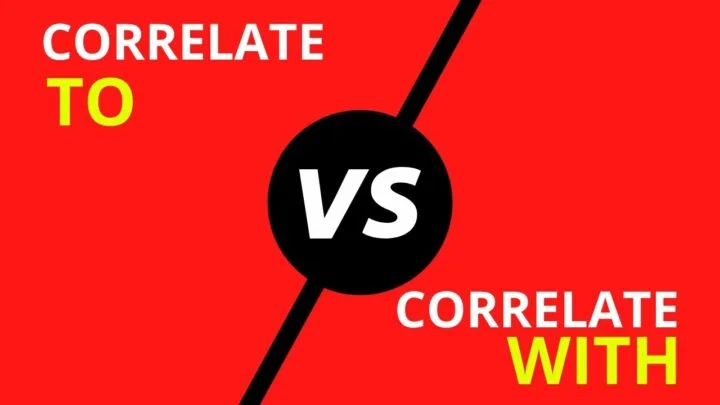“Correlate” is a verb you will often encounter while reading about scientific research. It indicates that two things are related.
You might see people use both “correlate with” and “correlate to.” How do you know which one to use?
This is another one of those usages that is not consistent even among native speakers. In most cases, whichever one you use, you will be understood.
However, it’s always better to use language properly if you can.
Plus, if you are taking a high-level English language exam, you could encounter a question that requires you to know the difference between the two.
This is where we come in!
What is the difference in “correlate with” and “correlate to”?
In most cases, the phrase “correlate with” should be used when you are talking about how two things are related. However, in practice, they are often used interchangeably. “Correlate to” should be used if you are talking about to what degree two things are related.
Using “correlate with” in a sentence
The simplest way to remember to use “correlate with” correctly in a sentence is to think of it as an idiom, a group of words that always go together.
If you are writing about how two things compare to one another, just keep in mind that “with” should be always be used instead of “to.”
For example, here’s how you might see it used:
The study found that obesity did not always correlate with a lack of exercise.
I’m hoping to show how good grades correlate with college acceptances.
Maybe you need to list research on a resume and you want to include a bullet point about your findings:
- conducted study showing that lack of sleep correlates with poor academic performance
Keep in mind that even if the verb form of “correlate” changes, the “with” remains the same:
Using “correlate to” in a sentence
There is one time when “correlate to” is the correct usage.
Sometimes, you may want to write about the degree to which two things correlate.
In these examples, you can see that “to” is not connecting the two things that correlate, as “with” does in the above examples. Instead, it is connecting “correlate” to how weak or strong the relationship is:
Why is “correlate to” often used in place of “correlate with”?
Even though “correlate with” is still used far more often than “correlate to,” you may still see “correlate to” sometimes, even in published work.
Why is this the case if the idiom is “correlate with”?
The reason is that language is not a scientific fact, like gravity. Grammar is just an effort to describe how people use language.
All languages change over time, and “incorrect” usages sometimes become “correct” usages simply because they become so widespread, particularly in a case like this one where there is not a strong grammatical basis for preferring one word over the other.
Therefore, “correlate to” might eventually become officially interchangeable with “correlate with.”
In the meantime, if you’re in doubt, go with the odds, err on the side of caution and use “correlate with”!

Hey fellow Linguaholics! It’s me, Marcel. I am the proud owner of linguaholic.com. Languages have always been my passion and I have studied Linguistics, Computational Linguistics and Sinology at the University of Zurich. It is my utmost pleasure to share with all of you guys what I know about languages and linguistics in general.

